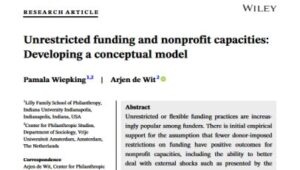Hurray! Our article ‘Unrestricted funding and nonprofit capacities: Developing a conceptual model’ is now out online at Nonprofit Management & Leadership. In this article, we theorize how unrestricted funding may relate to nonprofit capacities and consequently effectiveness. Our theoretical propositions are derived from a review of the academic and gray literature as well as a theory-based analysis of 20 in-depth interviews with grantees receiving multi-year unrestricted funding as a substantial part of their funding portfolio.
The article is published in Nonprofit Management & Leadership (open access).
We also wrote a practitioner note, which summarizes the full article and provides implications for philanthropic funders and nonprofit organizations.
Conceptual model
In the article we propose a conceptual model that hypothesizes how unrestricted funding may affect seven different nonprofit capacities: (1) financial management; (2) operational capacity; (3) staff management; (4) adaptive capacity; (5) strategic planning; (6) mission orientation; and (7) innovation. This framework can function as a much-needed starting point to support academics and nonprofit leaders to better understand how unrestricted funding relates to nonprofit capabilities and consequently nonprofit effectiveness.
Thank you
This article has been quite a journey. We want to thank the NML editor and reviewers for their constructive and developmental feedback through the different review rounds. We thank the Dutch Postcode Lottery for supporting our work, and especially Laura Santacreu, Margriet Schreuders, Odiel Evenhuis, Dorine Manson, Maaike Zeeuw, Marieke Rodenhuis, Martijn van Klaveren and Jonne Arnoldussen for their help throughout the project. Pamala Wiepking additionally thanks the Stead family for supporting her work. The authors are extremely grateful to Olivier Hunnik and Pelin Zenginoglu for their help in data collection and processing. Last but not least, a massive thanks to all the people we interviewed and their organizations for their participation.


